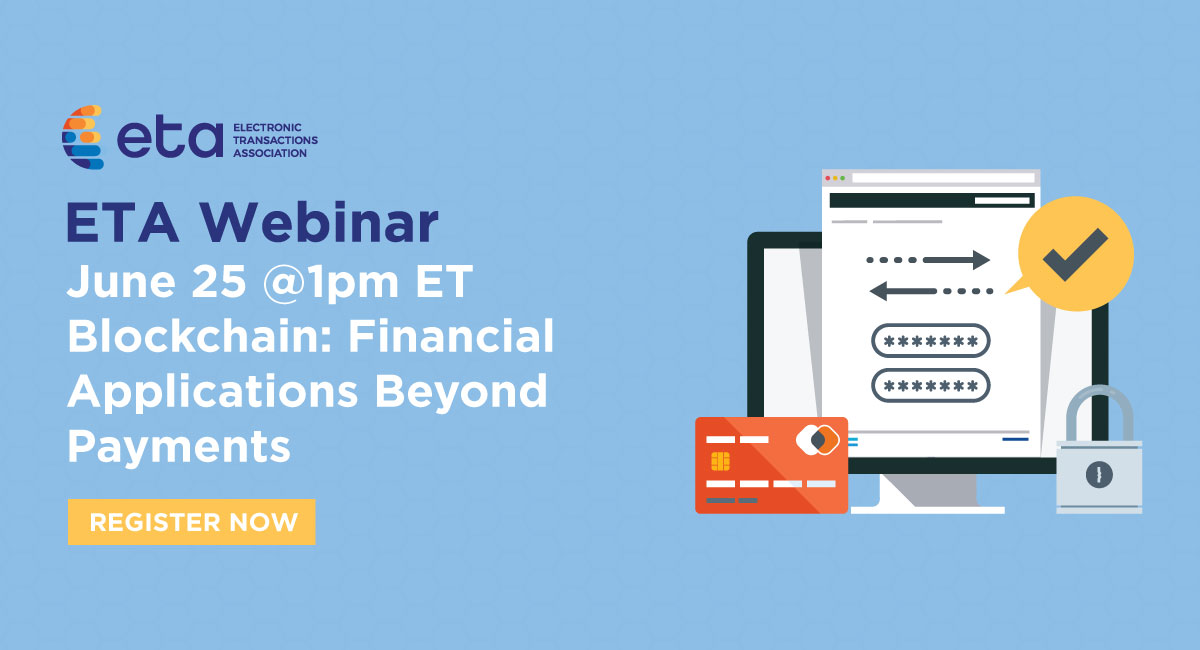Q+A: Blockchain Experts Weigh in on Financial Applications Beyond Payments
Distributed ledgers are reshaping the financial infrastructure of the United States and the global economy. The challenge lies in identifying and evaluating the right opportunities for your business.
On June 25th, ETA is hosting a webinar titled “Blockchain: Financial Applications Beyond Payments” which will explore blockchain and distributed-ledger technology in contexts extending beyond payments, including emerging payment rails, decentralized finance, QR code-based payment, bank-to-bank transfers and the back end. The presenters of the webinar are:
- Josh Mather, Worldpay
- Elizabeth White, The White Company
In advance of the webinar, Transaction Trends sat down with three blockchain experts to get their insights into blockchain technology, payments, and what the future might hold for the technology.
Read the interview below, and be sure to register for the webinar by clicking here to get the full picture. The webinar is free for ETA members and $99 for non-members.
The following responses have been edited for length and clarity.
Transaction Trends (TT): Why should payments companies care about / pay attention to developments in distributed ledger technology?
Josh Mather, Worldpay (JM): Companies involved in payments should care because it is working around the base of their ecosystem, potentially enabling the ability to pay with low or no fees and potentially faster at some point. Further, there is a lot of nibbling around the edges of the payments ecosystem, on/off ramping of fiat, digital transfer using crypto of both payments and other digital asset-based goods.
Mobile appears to be where we see early adoption with payments, and currently mobile payments in China exceed the US by 50 to 1, so we may see adoption in payments globally before we see it in North America. That said, youth and mobile technology as early adopters will drive the next wave of innovation. Payments companies will need to understand what the early adopters are doing and why they are doing it. The what is storing value in digital format and the why is that early adopters are the “new”s, to be in front of the line and drive innovation and at the core potentially provide more power and freedom to the world.
Tony Rose (TR): Distributed Ledger Technology (DLT) is rapidly maturing beyond bitcoin payment and Ethereum smart contract experiments. The threats and opportunities for players in the payments ecosystem are starting to become clear. Innovative companies can now start to develop new services, products, and customer segments not possible with legacy payment rails alone. Companies that are not paying attention risk being blindsided by disruptive technology that suddenly advances, accelerated by a global network effect.
Elizabeth White, The White Company (EW): DLT allows companies to build parallel payments systems that do not use traditional banking channels, yet can deliver payments faster, cheaper and with more security and transparency. It is especially useful to connect developing nations and the unbanked to the digital economy, allowing them to participate fully without relying on a traditional banking system that has long faced a “last mile” problem as well as a trust among that user base.
TT: How do you see the blockchain space evolving over the next 5-10 years?
JM: To put in perspective, I would say we are currently in the dip. Over the next 5 years, we should see maturing technology, and slow mainstream adoption of DLT technologies in different facets of life and industry. Primarily, I believe we will see this in global payments, supply chain technologies and identity systems. Over the 10-year time frame, look for DLT technologies to become more integrative, to where you won’t know they really exist, they are just part of your daily life, just as a credit card, stock brokerage or iPhone is now.
TR: Payments, finance, supply-chain, and identity experiments are maturing on Ethereum and other smart-contract platforms. These experiments will find ways to scale and replace existing products while powering a new tech-stack layer for the global economy. We will see the creation of entire new classes of digital financial products for entire new classes of customers.
EW: It will mature significantly, with only a few cryptocurrencies remaining. The rest of the applications of blockchain will fall along three main arcs: global payments, securities and investments, and portable trust apps, e.g. identity, supply chain, etc. The first two have already started to develop significantly, while the third has had significant enterprise resources deployed at it and we expect to see some game changing projects soon.
TT: How does your company fit into the blockchain ecosystem?
JM: Worldpay has extensive experience guiding crypto exchanges through the vast complexities of global payment processing — including leveraging Visa & MasterCard networks worldwide. We’ve helped some of the biggest names within the crypto space enter new markets. We are able to ease the burden of international expansion, letting you focus on your users. Our partnership approach with our customers allows us to better understand your needs as well as the need of your customers.
It ensures you reach as many users as possible, identifies the right payment options to drive conversion rates, and accesses tools to reduce churn and ensure all payments – whether one-off or recurring – are processed seamlessly.
EW: The White Company’s focus is on the first “arc” I mentioned: global payments. We connect users worldwide, enabling them to pay anyone, anywhere, for free, through our White Wallet application. We provide usability to cryptocurrency holders, allowing them to convert their holdings into 10+ currencies, Visa/MasterCard debit cards, as well as at top merchants like Uber, Amazon and iTunes. We’ve effectively built payments rails, using the Stellar protocol, which can also be used by others who are building blockchain based applications. Our next step is to provide critical services such as micro lending, through our existing platform, to users in developing countries who will never see a bank branch in their town.
Click here to register for the webinar.


